7 plants that repel ticks and keep them away from your yard
Keep tiny pests at bay with these tick-repelling plants
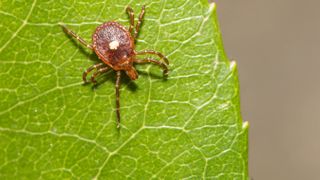
Whether you’re relaxing in the backyard, or enjoying outdoor gatherings, there’s nothing more frustrating than ticks in your space. These miniature, spider-like pests often go unseen, and easily attach themselves onto humans and pets. Similar to mosquitoes, these pests feed off blood, and can leave nasty bite marks on our skin, causing it to swell with an inflamed and itchy rash. In extreme cases, ticks can transmit fatal diseases as they bite, such as Lyme disease and Rocky Mountain spotted fever.
And if you don't want to pollute your yard with chemical-laden sprays, there are some popular plants known for repelling ticks, and keeping them away for good. Very similar to plants that repel mosquitoes or repel fruit flies, the strong aromas will actively prevent ticks from going anywhere near your yard. Additionally, these plants will make our yards smell fresh and fragrant.
So, if you want to banish these mini arachnids from your yard naturally, here are 7 plants that repel ticks. Just beware that some of these plants are toxic to pets if ingested, so always be mindful where you place them.
1. Lavender
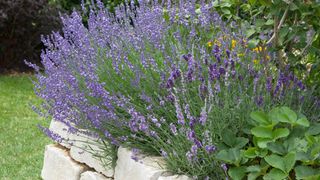
Lavender is loved for its pretty purple flower as well as the fresh, relaxing scent that fills the air. However, while the lingering fragrance is pleasant for our yards, it’s repugnant to ticks. Interestingly, it contains a non-toxic compound called linalool, which is an essential ingredient found in most insect repellents.
A good tip is to take a generous cutting from a lavender plant, tie it together in a small bunch before hanging it up. If you don’t have access to fresh lavender, you can opt for spraying lavender essential oils around the yard. The powerful, aromatic smell should keep ticks and other pests at bay.
2. Garlic and onions
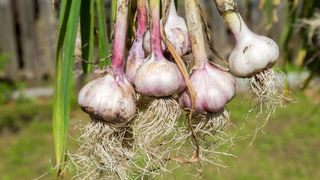
Found in most kitchens, garlic and onions are usually the key ingredients of every delicious and fragrant meal. And while we might enjoy such aromas, these are so repulsive to ticks that they will steer clear. This is down to their high quantities of sulfonic acid, which gives off a pungent smell that is a natural repellent.
Use this to your advantage to make a quick and easy garlic repellent. Simply cut up some garlic cloves, and sprinkle around your yard or "trouble" areas. Alternatively, crush four or five cloves to make a puree, and add that to a pint of water in a clean spray bottle. Then, spray your garlic solution in areas around the home or yard to repel ticks and other pests like rats and mice.
Sign up to get the BEST of Tom’s Guide direct to your inbox.
Upgrade your life with a daily dose of the biggest tech news, lifestyle hacks and our curated analysis. Be the first to know about cutting-edge gadgets and the hottest deals.
If you want to go one step further, you can learn how to grow garlic from cloves in your backyard or in pots.
G & F 1852-3 Women Soft Jersey Garden Gloves: $11 @ Amazon
Combining practicality with pretty, we recommend these women's gardening gloves for an affordable, but dependable accessory. They ranked as the best gloves for small hands in our best gardening gloves test. We found them to be both comfortable and soft, with good dexterity. Plus, you get three colors in a pack which is amazing value for money.
3. Rosemary
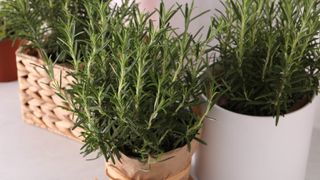
Rosemary may be a delicious aromatic herb to add to your meals, but is also a great tick-repellent. This is because ticks dislike the strong, distinctive odor, and will keep far away.
Luckily, rosemary is an easy herb to grow either indoors and outdoors, requiring full sunlight and regular watering. In addition, it is a hardy herb, so it can survive most conditions, but typically prefers hot and dry conditions. Simply water it, repot occasionally, and your potted plant will last long. Rosemary along with sage is also effective in repelling deer, spiders, and other insects will actively stay away as well.
If you’re planning on growing a herb garden, check out these 7 top tips for growing herbs indoors.
4. Wormwood
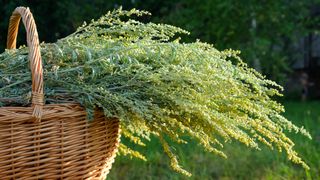
Wormwood is a perennial herb mainly grown as an ornamental plant in the U.S. These lush, green leaves are also known for its strong aroma and bitterness — making it the ideal, natural tick repellent.
For best results, include wormwood into your yard, within landscaping borders around patios, containers or even in hanging baskets. This can help deter these unwanted pests, and keep them out for good!
5. Marigold

With their warm, orange and yellow blooms, marigolds can really brighten up your home and yard. But these pretty florals also release the strong, spicy smell called alpha-terthienyl — a phototoxin that keeps ticks and other bugs far away.
What’s more, marigolds’ root system grows deeply and in abundance. So this pungent smell can also reach deep into the soil, wherever ticks might be lurking. In addition, marigolds prefer to be planted in the full sun and require dry conditions with well-drained soil.
6. Lemongrass
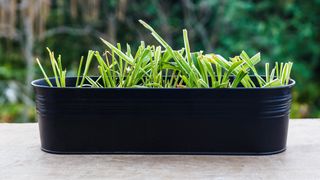
Similar to lemon balm and mint, the scent of lemongrass packs a powerful punch when it comes to keeping ticks away. It contains citronella oil, which can be extracted from the leaves and stem.
This produces an overwhelming citrusy scent, which repulses and overpowers ticks. Its scent comes in use in more ways than one as well — it will also keep mice and rats from invading your home too!
7. Chrysanthemums

These colorful blooms do well to add a vibrant touch to any yard, but also releases a potent smell to repel ticks and other pests. This is down to their flowers containing pyrethrum — an insecticidal compound that is an effective repellent.
Since chrysanthemums are popular plants, you can easily pick some up in your local gardening store, and either place around your yard, and on your patio or porch area. In fact, chrysanthemums can be commonly used to repel ants, spiders, fleas, and even bed bugs amongst many. So it’s a super plant repellent!
It’s also worth noting that these blooms are known to be toxic to both cats and dogs, so keep pets away where possible.
More from Tom's Guide

As the Homes Content Editor, Cynthia Lawrence covers all things homes, interior decorating, and garden-related. She has a wealth of editorial experience testing the latest, ‘must-have’ home appliances, writing buying guides and the handy ‘how to’ features.
Her work has been published in various titles including, T3, Top Ten Reviews, Ideal Home, Real Homes, Livingetc. and House Beautiful, amongst many.
With a rather unhealthy obsession for all things homes and interiors, she also has an interior design blog for style inspiration and savvy storage solutions (get rid of that clutter!). When she’s not testing cool products, she’ll be searching online for more decor ideas to spruce up her family home or looking for a great bargain!
-
PixieFly03 “…nothing more annoying than ticks flying around in your space. ”Reply
And all these years I never knew ticks could fly. Wow!
No wonder our children are practically illiterate when people post stupidity as truth. SMH 🤦🏾♀️ -
Gdscast2 Yeh. I Agree Pixefly! That was almost exactly what I said to myself when I read that about ticks flying! But I will refrain from speaking so coarsely. (although I would like to!).Reply
Also what needs to be said, is that some of those suggested botanicals are toxic to dogs, and could kil them if they had too much contact or accidentally ingesting them. I dont know about all of them (nor have time to research them all), but will say; if you love your dog, keep your pup far away from both garlic (onions, chives etc) as well as marigold plant. Both are deadly for your little furry friends, even at small doses.
It upsets me to see someone write such suggestive articles, without also disclosing the risks...not just the benefits!
